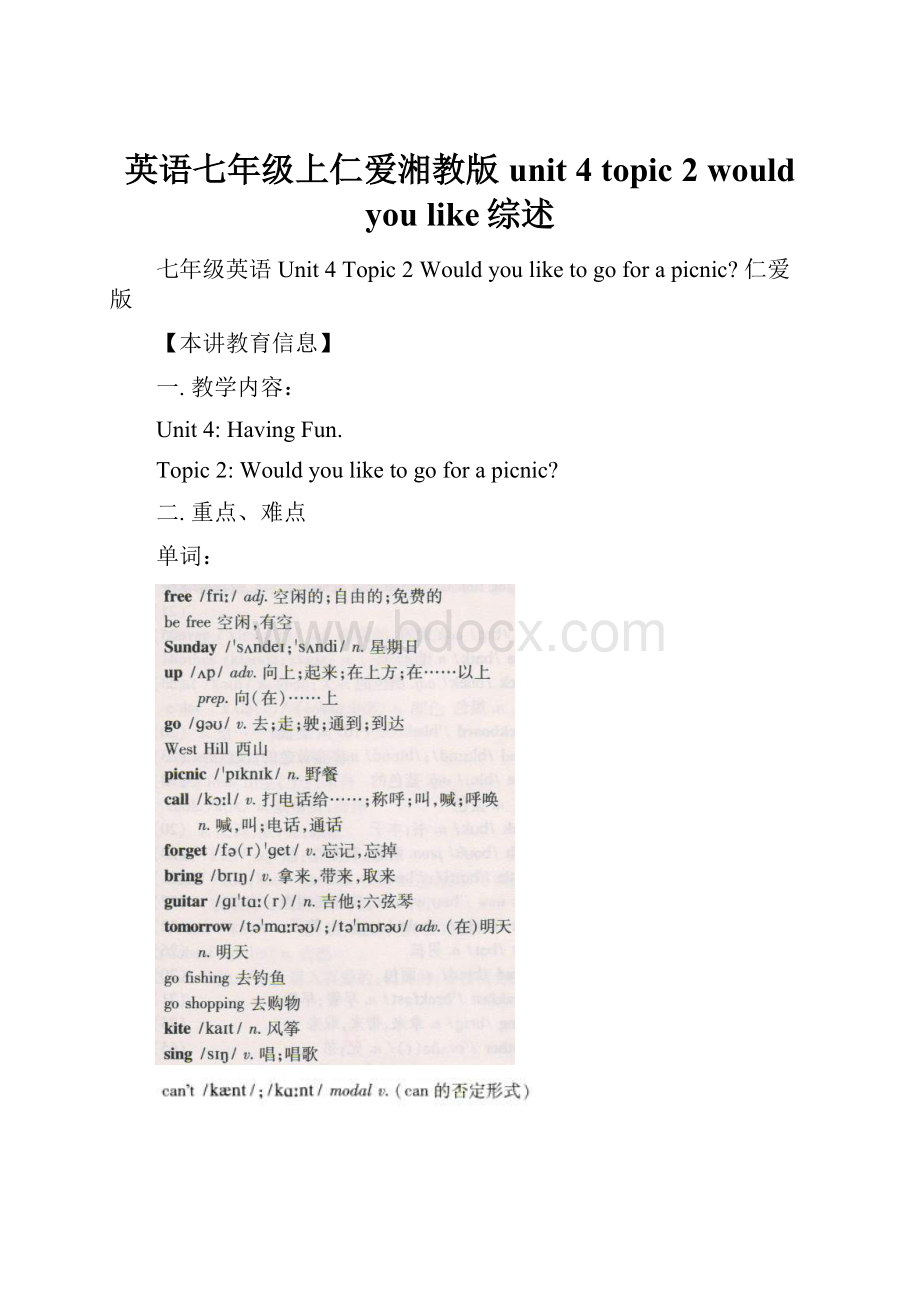英语七年级上仁爱湘教版unit 4 topic 2 would you like综述.docx
《英语七年级上仁爱湘教版unit 4 topic 2 would you like综述.docx》由会员分享,可在线阅读,更多相关《英语七年级上仁爱湘教版unit 4 topic 2 would you like综述.docx(18页珍藏版)》请在冰豆网上搜索。

英语七年级上仁爱湘教版unit4topic2wouldyoulike综述
七年级英语Unit4Topic2Wouldyouliketogoforapicnic?
仁爱版
【本讲教育信息】
一.教学内容:
Unit4:
HavingFun.
Topic2:
Wouldyouliketogoforapicnic?
二.重点、难点
单词:
句子讲解:
语法精粹:
表示请求、建议、征询对方意见的一般疑问句:
WouldyouliketogotoWestHillforapicnic?
Howaboutflyingakitewithme?
WhatabouthavingapicnicwitholdMcDonald?
金点剖析:
[金点1]AreyoufreethisSunday?
这个周日你有空吗?
freeadj.常与be动词连用,意为“有空的”。
其反义词为busy“繁忙的”。
如:
Iamfreetoday.=Ihavetimetoday.我今天有空。
[拓展]free还有“免费的”意思。
如:
Theticketisfree.这张票是免费的。
[金点2]PleasetellMariaaboutit.请把这件事告诉玛丽亚。
tellsb.aboutsth.意为“告诉某人某事”。
如:
Youhavetotellhermotheraboutit.你不得不把这件事告诉她母亲。
[注意]当sb.和sth.是代词时,必须用宾格。
如:
Don’tforgettotellhimaboutthem.别忘了告诉他那些事。
[金点3]Don’tforgettobringyourguitar.不要忘记带上你的吉他。
(1)本句为否定祈使句。
祈使句主要用来表示劝告、请求、命令、叮嘱、号召等。
[拓展]肯定的祈使句有三大特征:
1)无主语;
2)动词原形开头;
3)表示请求语气时常与please连用。
否定的祈使句通常是在肯定的祈使句前加Don’t。
如:
Openthedoor.开门。
→Don’topenthedoor.别开门。
Closethewindow,please.请关窗户。
→Don’tclosethewindow,please.请别关窗户。
(2)forget的用法:
1)forgetsth.忘记……如:
Don’tforgetyourbag.别忘了你的包。
2)forgettodosth.忘记去做某事(还没有做)如:
Don’tforgettotellhim.别忘了告诉他。
[拓展]forgetdoingsth.忘记做过某事(已经做过)如:
Iforgetseeinghimbefore.我忘了以前见过他。
[金点4]goshopping去购物gofishing去钓鱼
go+v.–ing结构很常用,而且多用于加体育活动和业余娱乐活动的动名词。
如:
goswimming去游泳,goboating去划船,goskating去滑冰,goclimbing去爬山等。
[金点5]——Steve,howaboutflyingakitewithme?
斯蒂芬,和我去放风筝怎么样?
——I’dlikethat,but…我愿意去,但……
howabout…?
=whatabout…?
用于征询对方意见,后接名词或代词;若后面是动词,则动词应用-ing形式,不能接动词原形。
如:
What/Howaboutsomebananas?
香蕉怎么样?
What/Howaboutsomethingtodrink?
要不要喝些什么?
What/Howaboutgoingshoppingwithme?
和我去买东西如何?
[链接]类似的表示请求、建议、征询对方意见的句型还有:
1)——Wouldyouliketodosth.?
你愿意做某事吗?
——
2)——Whynot/don’tyoudosth.?
为什么不做某事呢?
——Goodidea!
好主意!
3)——Let’sdosth.让我们做某事吧。
——
[即时演练]
按要求完成句子
1.CouldyouaskLisatocall(call)meback?
(动词的适当形式)
2.Wouldyouliketogoshopping?
(改为同义句)
Whataboutgoingshopping?
[金点6]…butI’mafraidIhavenotime.……但是我担心我没有空。
(1)afraidadj.担心的,害怕的
beafraid恐怕,后面常跟句子,表示为已发生或可能发生的事情而担心。
如:
I’mafraidyouarewrong.恐怕你错了。
[拓展]表示“害怕(做)某事”时,可以用beafraidof(doing)sth.这一结构,或者用beafraidtodosth.如:
——Whatareyouafraidof?
你害怕什么?
——I’mafraidofdogs.我害怕狗。
(2)no的用法:
no作为副词,常对问句作答。
如:
——Isthisyourwatch(手表)?
这是你的手表吗?
——No,itisn’t.不,不是的。
[拓展]作为形容词,修饰名词,相当于“nota(n)/any+名词”;修饰可数名词,相当于“nota(n)+单数名词”或“notany+复数名词”;修饰不可数名词,相当于“notany+不可数名词”。
如:
Ihavenopet.=Ihavenotapet.我没有宠物。
WehavenoclassesonSunday.=WehavenotanyclassesonSunday.星期天我们不上课。
[金点7]Ihavetocarrysomewater.我不得不提些水。
haveto表示“不得不”的意思,强调的是客观情况。
如:
Tomhastostayathometolookafterhisbrother.
汤姆不得不待在家里照看他的弟弟。
Maryhastostudylateintothenightinordertopasstheexam.
为了通过考试,玛丽不得不学习到深夜。
(客观需要)
Itrainsalldaylong,sowehavetostayathome.
整天都在下雨,所以我们不得不待在家里。
(外部环境所迫)
[金点8]MayIspeaktoMaria?
我可以和玛丽亚说话吗?
(1)speaktosb.表示“向(和)某人说话”。
如:
Let’sspeaktoJane,OK?
让我们去和简说说话,好吗?
(2)speak还可以在后面直接加宾语,表示“说(某种语言)”。
如:
CanyouspeakChinese?
你会说汉语吗?
[金点9]Oh,sorry.Sheisn’tinnow.噢,对不起,她现在不在家。
isn’tin表示“不在家”。
相当于isout或isnotathome。
这句话可以用Sorry,sheisout.或Sorry,sheisn’tathome.来表达。
[拓展]athome是固定短语,意思是“在家里”。
在句子里,它前面要加be动词,beathome=bein。
如:
Mikeisnotathomenow.=Mikeisnotinnow=Mikeisout.迈克现在不在家。
IstayathomeeverySunday.每个星期日我都待在家里。
[金点10]Couldyouaskhertocallmebackthisevening?
你能让她今天晚上给我回个电话吗?
(1)asksb.todosth.意思是“叫某人去做某事”。
如:
CouldyouaskMariatomakeaplanforthepicnic?
你能叫玛丽亚制定一个野餐计划吗?
[拓展]类似的结构有:
tellsb.todosth.告诉某人做某事wantsb.todosth.想要某人做某事。
(2)callsb.back给某人回电话。
如:
Pleasecallyourmotherbacktomorrow.请你明天给你的妈妈回电话。
[注意]在asksb.todosth.和callsb.back两个短语中,当sb.是人称代词时,应该用宾格形式。
巧学妙记:
巧记电话用语
电话用语要记住,拿起话筒说Hello。
询问对方在不在,MayIspeakto来替代。
介绍自己thisis…,禁止“Iam”此句式。
询问对方哪一位,Who’sthis最相宜。
电话对话常用语,多多使用大有益。
[说明]打电话的常用语大家必须清楚。
请某人接电话,可以说May/CanIspeakto…,please?
;介绍“我是……”应用Thisis…(speaking);Who’sthis?
表示“你是哪一位?
”另外,打电话用语的表达还有很多,希望大家在今后的学习中注意归纳、总结。
三.具体内容:
课文讲解:
Topic2Wouldyouliketogoforapicnic?
SectionA
1a
Look,listenandsay
Jane:
Hello!
Kangkang:
Hello,Jane!
ThisisKangkang.
Jane:
Hi,Kangkang!
Kangkang:
AreyoufreethisSunday?
Jane:
Yes.What’sup?
Kangkang:
WouldyouliketogotoWestHillforapicnic?
Jane:
Oh,I’dloveto.
Kangkang:
PleasetellMariaaboutit.
Jane:
Sure.I’llcallher.
Kangkang:
Don’tforgettobringyourguitar.
Jane:
Allright.Seeyouthen.
Kangkang:
Seeyou.
1b
Pairwork
Practicetheconversationabovewithyourpartner
1c
Workalone
MatchthesentencesinColumnAwiththoseinColumnB.
AB
1.Seeyoutomorrow.a.Sure.
2.Pleasetellhimaboutthepicnic.b.Yes.What’sup?
3.Hello!
c.Hello,Peter!
ThisisLinda.
4.Areyoufreethisafternoon?
d.Yes.I’dloveto.
5.Wouldyouliketogofishing?
e.Seeyou.
答案:
1→e2→a3→c4→b5→d
SectionB
1a
Listen,readandsay
Jane:
Wouldyouliketosingsomesongswithme?
Kangkang:
I’msorryIcan’t.Ihavetocook.
Michael:
Wouldyouliketocookwithus?
WangJunfeng:
Yes,I’dloveto.It’sfun.
Maria:
Steve,howaboutflyingakitewithme?
Steve:
I’dlikethat,butI’mafraidIhavenotime.Ihavetocarrysomewater.
Maria:
Howaboutyou,Bobby?
Bobby:
Bow-wow.
1b
Pairwork
Readtheconversationsaboveagainandrole-playthem.
.1c
Workalone
Completethepassagewiththecorrectformsofthewordsorphrasesinthebox.
want,haveto,for,food,with,fly,carry
OnSunday,Kangkanggoesoutforapicnicwithhisfriends.Theytakesomefoodthere.JanewantsKangkangtosingsomesongswithher,buthehasnotime.Hehastocook.WangJunfengandMichealwouldliketohelpKangkang.Stevecarrieswaterforthem.AndMariafliesakitewithherdog.Theyareallveryhappy!
2a
Listen,readandsay
Maria’smother:
Hello!
Sally:
Hello!
MayIspeaktoMaria?
Maria’smother:
Oh,sorry.Sheisn’tinnow.Who’sthis?
Sally:
ThisisSally.Couldyouaskhertocallmebackthisevening?
Maria’smother:
Sure.
Sally:
Thankyou.Goodbye.
Maria’smother:
Bye.
2b
Workalone
Choosethecorrectsentencestofillintheblanks.
A:
Hello1
B:
Hello!
____5____
A:
Sorry.____2____Who’sthis?
B:
ThisisWangJunfeng.____4____
A:
Sure.Doeshehaveyourphonenumber?
B:
____1____Myphonenumberis8556-3677.
A:
8556-3677.____3____
B:
Thankyou.Goodbye.
A:
Bye.
1.No,hedoesn’t.
2.Heisn’therenow.
3.Allright.I’lltellhimaboutit.
4.Couldyouaskhimtocallmebackthisafternoon?
5.MayIspeaktoLiMing,please?
3
Listenandfollow.
SectionC
1a
Readandunderstand
APicnic
SectionD
1
Listenandfollow
2
Workalone
Listenandfilloutthetable.
Name
ThingstodoonSunday
Peter
Billy
Sally
3
Grammarfocus
Invitation
WouldyouliketogotoWestHillforapicnic?
Oh,I’dloveto.
Steve,howaboutflyingakitewithme?
I’dlikethat,butI’mafraidIhavenotime.
Thatwouldbeverynice.
WhatabouthavingapicnicwitholdMcDonald?
I’dlikethat,thanks.
【典型例题】
[迷点1]翻译电话用语
——你是谁?
——我是杰克。
[指津]此题答案是:
——Who’sthis?
——ThisisJack.
[解后反思]学习英语一定要排除汉语的干扰,要按英语的习惯表达。
以上是打电话时的常用语。
打电话时要表达“我是……”时,要说Thisis…;表示“你是……吗?
”要说Isthat…,问“你是谁”时,要说Who’sthis?
[迷点2]Don’tforgetto_______yourbookstoschooltomorrow.
A.bringB.takeC.carry
[指津]A
[解后反思]take指从这里把某人或某物“带走”,“拿走”;bring指从别处把某人或某物“带来”或“拿来”;carry的意思是“携带”,“带着”,“搬运(较重的东西)”,无方向性。
故应选bring。
[迷点3]改错:
Notforgettobringacamera(照相机).
ABCD
[指津]ANot改为Don’t
[解后反思]祈使句的肯定式和否定式分别是:
Dosth.和Don’tdosth.如:
“请把窗户打开。
”应译为Pleaseopenthewindow.
“不要打开书。
”应译为Don’topenyourbooks.
[迷点4]改错:
CouldyouaskJackcallmebacktomorrow?
ABCD
[指津]Ccallme改为tocallme
[解后反思]“叫某人做某事”应使用ask/tellsb.todosth.结构。
要正确使用带to的动词不定式结构:
to+动词原形。
如:
Canyouaskyourbrothertocomeheretomorrow?
你能叫你弟弟明天来这儿吗?
TellthemtostudyEnglisheveryday.
告诉他们每天学英语。
[迷点5]Please_________itinEnglish,notinChinese.
A.speakB.talkC.tellD.say
[指津]D
[解后反思]say必须带宾语,强调说的内容。
speak强调有说话的能力,一般不跟宾语,若跟宾语只跟语言,表示有讲某种语言的能力。
talk则是谈论,常与to,with和about一起连用。
tell表示告诉,一般是告诉某人某事。
经典探究:
[典例1]——Wouldyoulike________withme?
——Yes.I’dloveto.
A.tohaveapicnic
B.haveapicnic
C.tohavepicnic
D.havepicnic
[解析]Awouldlike后面只能跟动词不定式todosth.,haveapicnic是固定短语。
[典例2]——Thankyou.
——__________
A.OK.B.Allright.
C.Notatall.D.Right.
[解析]COK.和Allright.是对对方某种意见、想法的赞同、允许。
Notatall.不客气,则是对Thankyou.的回答。
对Thankyou.的回答还有以下表达方式:
Youarewelcome./It’smypleasure./That’sOK./That’sallright.等等。
[典例3]——_________shehaveyournumber?
——Yes,she_________.
A.Does;doesB.Do;does
C.Does;haveD.Do;has
[解析]A句子主语she是第三人称单数,用助动词does构成一般疑问句。
其肯定回答用does,否定回答用doesn’t。
[典例4]——Howabout________?
——Goodidea.
A.goingfishB.gofishing
C.goingfishingD.togofishing
[解析]Chowabout后面只能跟动词-ing形式,doingsth.,gofishing是固定短语。
[典例5]Diana’sbrotheristooyoungandtheirmotherisout.Soshe_____lookafterhimathome.
A.canB.mayC.havetoD.hasto
[解析]Dcan表示“能”;may表示“可以”;haveto表示“不得不”的意思,强调的是客观情况。
Diana的妈妈不在家,她的弟弟又太小,所以她不得不被迫待在家里照顾她的弟弟。
she是第三人称单数,故用hasto。
【模拟试题】
一.将下列句子改为一般疑问句:
1.Thereissomefruitjuiceintheglass._____________________fruitjuiceintheglass?
2.Hehastostayhere._____he______tostaythere?
3.Wedoeyeexerciseseveryday.____you______eyeexerciseseveryday?
4.Shehassomethingtoeat.___she____________toeat?
5.Iamgoodatsinginganddancing.____yougoodatsinging______dancing?
二、对划线部分提问:
1.Mymothergoestoworkbybike.____________yourmother_______towork?
2.Thatis